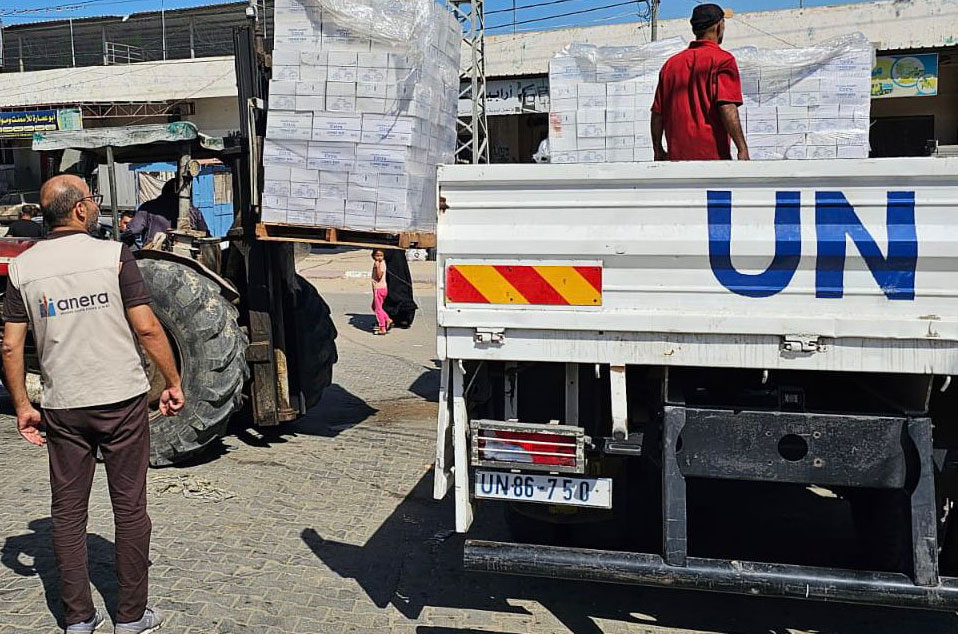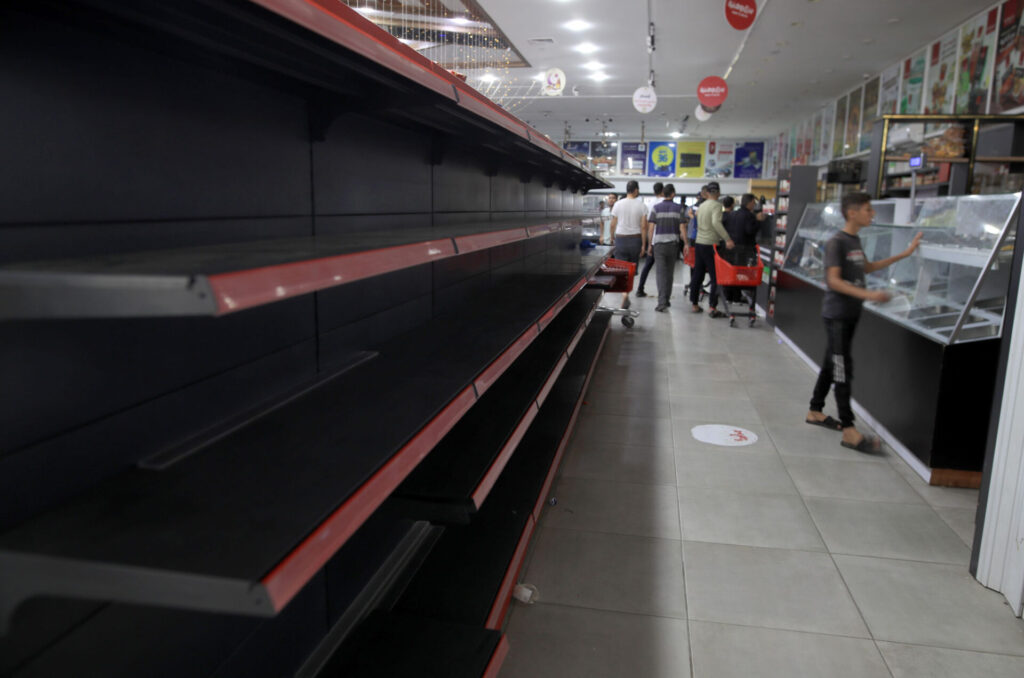Navigating Challenges to Deliver Humanitarian Relief in Wartime Gaza
Posted in: About Anera
The ongoing war in Gaza presents formidable challenges for organizations like Anera striving to deliver humanitarian aid. The relentless pace of violence and overwhelming scale of destruction and need have created conditions that are testing the capacity and ability of the international community.
Each day of the war calls for urgent response. Anera, like the other organizations delivering relief in Gaza, is moving fast to help. Since the beginning of the war, our staff in Gaza, supported by all of our other offices, have worked nonstop to reach people who are vulnerable and suffering in Gaza.
Staff Well-being
Anera’s staff in Gaza are not just dedicated professionals, they are individuals who, quite literally, risk their lives daily on the front lines, facing real and imminent dangers. This is as they face immense personal challenges and grapple with unimaginable grief, alongside everyone else in Gaza. After all, they are from the communities they serve and they are living through the unimaginable destruction of their homes and communities – the places they grew up and have made memories. They, and the volunteers who help them, are living in harsh conditions, either in crowded shelters, with host families, or are themselves hosting extended family. All of them are thirsty, hungry, exhausted and traumatized. The omnipresent sounds of drones and bombings further complicate things, making it a constant battle to concentrate on essential tasks. Yet, they persist in their efforts, finding purpose in serving their communities.
The actions of our staff in Gaza are nothing short of heroic. But to only see them as heroes is in a sense a form of dehumanization. They are people who are doing heroic things to stay alive and to keep those around them alive. But they are pushing their bodies and minds beyond every limit, all while experiencing the same torment as everyone else in Gaza. And because Anera’s mission tends to attract people with a proclivity for selfless acts born out of compassion, we have witnessed our Gaza team’s strength in the way they continually push themselves, despite everything they are going through, to deliver aid.


Communications Impediments
Communication breakdowns are a daily struggle in Gaza, with frequent blackouts disrupting mobile services and internet connectivity. The electrical grid has been down since October 12. These factors hamper real-time information exchange, making it challenging to assess the safety of our staff or to respond promptly to critical situations. Every time a colleague, a partner, or a vendor answers the phone we are grateful to know that they are alive.
Market Assessments and Resource Scarcity
The team faces the daily challenge of conducting market assessments to identify local resources that might be available for immediate purchase and distribution. And, luckily, Anera has relationships with trusted, vetted vendors throughout Gaza. The process of finding local resources is essential for responding to needs, but it is hampered by the ongoing violence, closures, destruction and increasing scarcity of supplies.
Scarcity also brings Inflated prices, particularly for essential materials like fuel. Staff members sometimes are forced to pay exorbitant prices for necessities. One of our colleagues, for instance, paid $90 for five liters of gas for an Anera vehicle (before the war it would have been $15-$18), so that he could reach the field where vegetable baskets and hot meals were being prepared. This economic strain extends to the most mundane of everyday items, like salt, and packaging materials for food distributions.


Logistical Obstacles
Delivering Inside of Gaza
Every day is a logistical challenge for our colleagues in Gaza. They face chronic shortages of fuel and other supplies. Relief shipments coming through the border must be offloaded from the truck that brought them in onto a different truck that is allowed to travel within Gaza. Trucks can come in at all hours and the scene at Rafah is quite chaotic. At times trucks have been delayed in entering because vehicles needed to move products don’t have the fuel to run. Once shipments are on a truck, they go to one of our distribution centers for disbursement.
Aid disbursement is challenging because Anera’s geographic areas of response change constantly, as roads can close abruptly or be damaged to the point that they are no longer passable, and entire districts may become no-go zones at a moment’s notice. In addition, our staff is responding to ever-expanding needs and desperation because displaced families are being squeezed into a smaller and smaller area, where there is severe overcrowding and misery.
Delivering from Egypt
Anera has been successfully delivering aid into Gaza for many decades through a well-developed system that coordinated shipments through the Karem Shalom commercial crossing between Israel and Gaza. When the war began, shipments through Israel were immediately halted and the Rafah border with Egypt became the only entry point into Gaza. Anera had never operated in Egypt before.
Suddenly we found ourselves, along with many other aid agencies, learning to navigate new and ever-changing circumstances, bureaucracies and procedures to prepare and send shipments. A couple of our staff stepped in and began operations, but the context is entirely new for them and for Anera. We do not have long-standing networks and trusted relationships in Egypt like we do in all of the other countries where Anera works. This can sometimes lead to difficult situations, as demonstrated by a failed attempt to procure fire-retardant and water-resistant tents. Inspection by a staff member from Palestine revealed that the tents we had planned to procure in Egypt did not meet specifications, resulting in the cancellation of the purchase. Now, we are looking to find tents in Turkey and Jordan.
Monitoring and Data Challenges
Monitoring progress and obtaining updates on work are monumental tasks in the midst of conflict, especially with one area closed off from another. Staff resort to pen and paper as the absence of wifi and unstable electricity makes regular laptop usage impossible. This reliance on manual methods delays information gathering and hampers data management and sharing. Lack of data on internally displaced persons and their shelter locations further complicates coordination among different actors in the field, making fair distribution of assistance a formidable challenge. To overcome this obstacle as best we can, aid organizations on the ground in Gaza, including Anera, are working as collaboratively as possible to ensure efforts are not duplicated and each organization plays to its strengths in meeting ever growing needs.
Conclusion
In the face of all of the challenges to delivering aid in Gaza, Anera’s dedicated staff continues to work against the odds to address the pressing needs of their community. However, without a prompt ceasefire and unconditional access for aid, the situation continues to be catastrophic. The population of 2+ million people are in desperate need and living conditions are becoming worse and worse. The ongoing efforts of our team persist out of necessity. Life doesn’t pause amid bombardment, but rather becomes an unimaginably difficult struggle. Urgency underscores every action as we all hope for a swift end to the immense suffering in Gaza.
OUR BLOG
Related
A joint statement issued by international non-governmental organizations. Despite repeated calls on Israel from heads of state, UN officials and humanitarian NGOs to refrain from expanding its ground offensive to Rafah, Israeli troops entered the governorate on May 7. Over…
For Palestinians around the world, May 15th marks the “Nakba” (literally “disaster” or “catastrophe” in Arabic) which commemorates the 1948 Palestinian exodus during the establishment of the State of Israel. Nakba Day 2022 For Palestinians around the world, May 15th…
